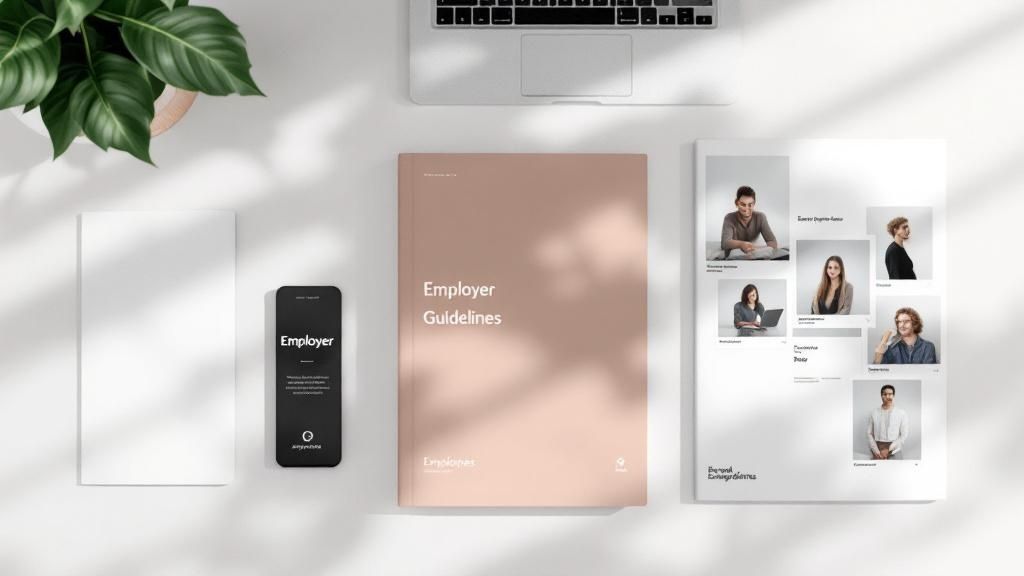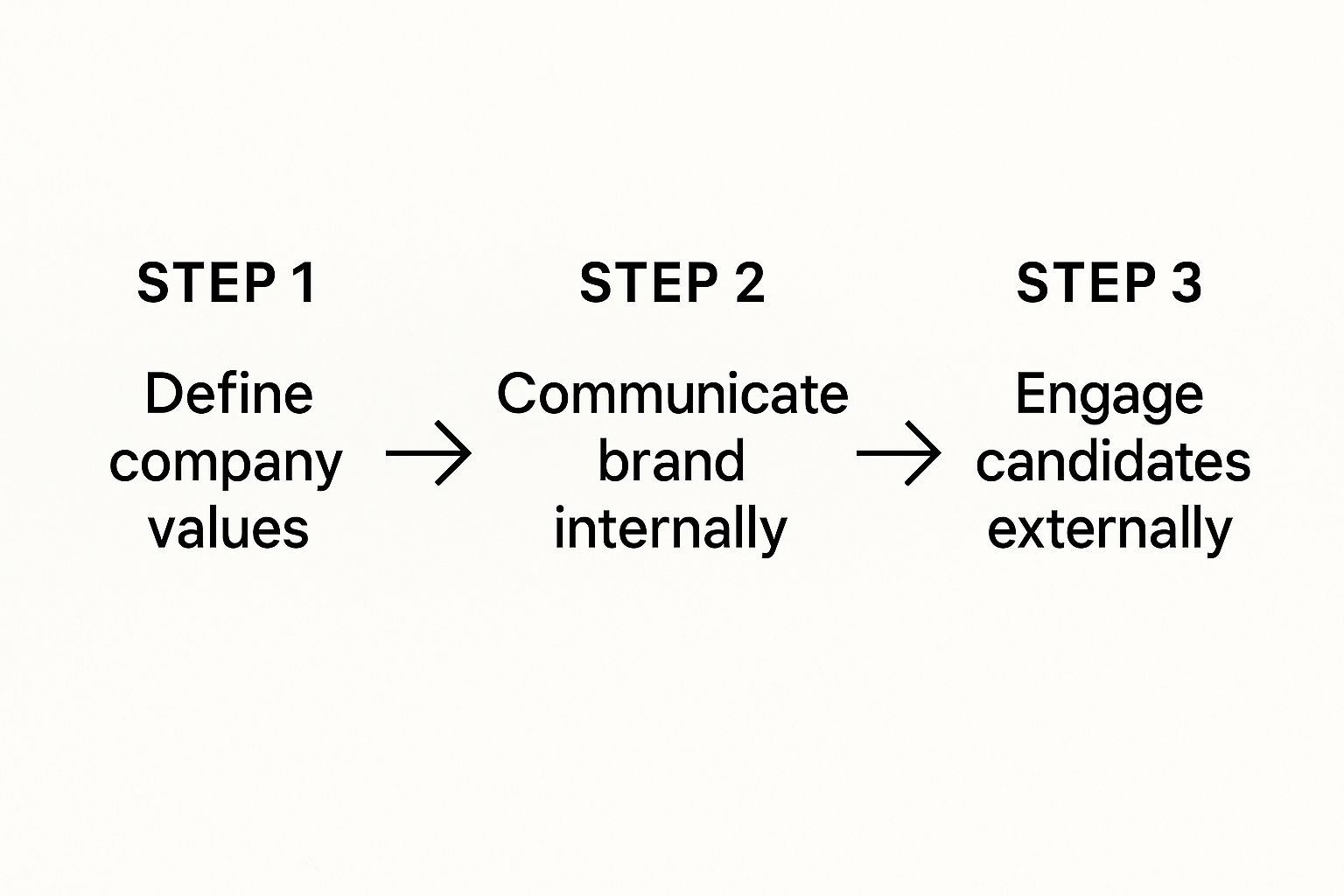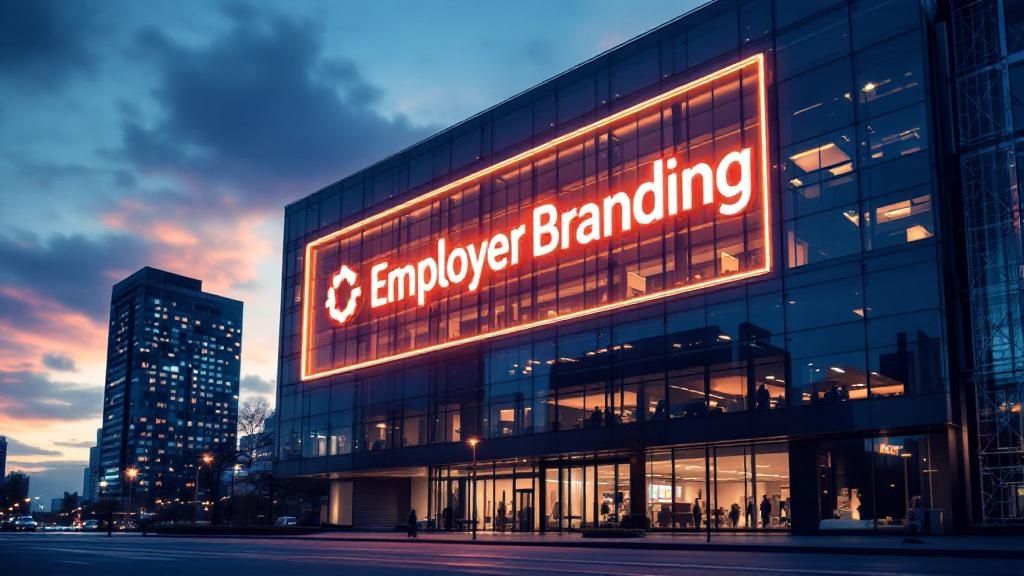August 19, 2025
What is Employer Branding? Key Strategies to Attract Top Talent

Ever wonder what people say about your company as a place to work? That, in a nutshell, is your employer brand. It’s your reputation, shaped by what current, past, and potential employees think and feel about you.
Think of it as the story people tell about your organization when you're not in the room. This perception is powerful, and it directly influences your ability to attract and keep the best people on your team.
Understanding Your Reputation as an Employer
If your main company brand is about selling a product or service, your employer brand is about selling the experience of working for you. It's not just some HR buzzword; it’s a critical business function that shapes how the entire talent market sees your company.
This reputation is built from every single interaction someone has with you as an employer. It starts with the first impression on your careers page, continues through the interview process, and is solidified by the stories your current employees share.
A strong employer brand has to be authentic. It’s the promise you make to your team about your culture, values, and mission—what we call your Employee Value Proposition (EVP). But it's not enough to just say it; your brand has to reflect the real, day-to-day experience of working in your company.
Why It Matters More Than Ever
In today's tight job market, a standout employer brand isn't just nice to have; it's a massive competitive advantage.
The numbers don't lie. A staggering 88% of job seekers say a company's reputation is a major factor they consider before even thinking about applying. Companies with strong employer brands don't just get twice as many applications—they also cut their hiring costs by 50% and see a 28% drop in employee turnover.
This long-game strategy of shaping perception is very different from the short-term goal of recruiting.
"Recruiting is about filling a seat. Employer branding is about making sure it's the right person, for the right reasons, who wants to stay and grow with you."
Recruiting is about filling an open role right now. Employer branding is about building a steady pipeline of amazing people who want to work with you in the future.
Employer Branding vs Recruiting At a Glance
It's easy to confuse these two, but they have very different jobs. Employer branding warms up the audience, while recruiting steps in to close the deal. Here's a quick breakdown to see how they're different yet work together.
Ultimately, employer branding and recruiting are two sides of the same coin. A strong brand makes a recruiter's job infinitely easier by creating a magnetic pull that attracts great candidates, a key part of understanding what is sourcing in HR. Instead of constantly chasing talent, people start coming to you. That distinction is the foundation of a truly resilient hiring strategy.
The Building Blocks of a Magnetic Employer Brand

A powerful employer brand isn't something you stumble upon; it's meticulously built. It’s a careful blend of core components that, when woven together, create an identity that top talent finds genuinely compelling. To build a brand that not only attracts but also keeps great people, you first have to understand these foundational pillars.
These aren't just buzzwords or corporate fluff. They are the real, tangible elements that shape what it’s like to work at your company day in and day out. When they all point in the same direction, they tell a consistent and powerful story about who you are.
Culture, Mission, and Values
It all starts with your company culture. Think of it as the personality of your organization—the shared beliefs, attitudes, and unwritten rules that dictate "how we do things around here." It's the vibe your employees feel every single day.
Your mission and values are how you put that culture into words. They spell out your company's purpose and the principles you stand for. But here’s the critical part: they can't just be words hanging on a poster in the breakroom. For them to mean anything, they have to be visible in your daily operations, influencing everything from your hiring process to how you celebrate a big win. Communicating this effectively is key, which is why it helps to create your essential brand voice guidelines to keep your messaging consistent.
The Employee Value Proposition
At the very core of your employer brand is the Employee Value Proposition (EVP). This is the deal you offer employees. It’s the promise you make in return for the talent, time, and energy they bring to the table.
The EVP answers the one question every candidate and employee has: "What's in it for me?" It clearly defines the unique mix of rewards and benefits they get by joining your team.
A truly compelling EVP is about so much more than a paycheck. It covers the entire spectrum of the employee experience, including:
- Compensation and Benefits: This is the baseline—fair pay, solid health insurance, and retirement options.
- Career Development: Real opportunities to learn, grow, and move up within the company.
- Work Environment: A supportive culture, a healthy work-life balance, and great colleagues.
- Company Mission: The opportunity to do work that feels meaningful and makes a genuine impact.
Your EVP is your secret weapon in the talent marketplace. It's what convinces someone to choose you over a competitor, even when the salary is similar. For it to work, it has to be authentic, genuinely valuable to your people, and uniquely yours.
Candidate and Employee Experience
Ultimately, your employer brand is the sum of every experience people have with your company. This journey begins the very first time a candidate hears your name and continues well beyond an employee's final day. Every single interaction shapes their perception.
A smooth, transparent, and respectful candidate experience sends a strong signal about what your company values. In the same way, the daily employee experience—from the first day of onboarding to everyday team meetings—is where your brand promise is either kept or broken.
The most powerful proof of your brand comes directly from your people. Authentic employee stories and testimonials are gold. When your own team members become your biggest fans, sharing their positive experiences, your brand's credibility and reach explode. Their voices bring your culture and EVP to life in a way that no polished corporate message ever could.
Unlock the Real Benefits of Employer Branding

When you invest in your employer brand, the payoff isn't just a recruiting perk—it creates a ripple effect that strengthens the entire business. Sure, attracting better talent is the most visible win, but the real magic happens behind the scenes, boosting your company from the inside out. These are the kinds of tangible benefits that make it easy to get leadership on board.
First and foremost, a powerful reputation makes hiring so much easier and more cost-effective. When top candidates already know you’re a great place to work, you stop spending your budget trying to convince them and start having real conversations. This shift directly impacts the bottom line.
A strong employer brand can slash your cost-per-hire by up to 50%. Think about that—it’s not a small tweak, but a major financial advantage that lets you reallocate those funds to other critical initiatives.
This isn’t just about saving money, either. Companies with magnetic brands also fill roles faster, which means less downtime and lost productivity from having an empty seat. Building your brand proactively is now a fundamental part of smart recruitment best practices.
Boost Retention and Engagement
Maybe the most profound benefit of a strong employer brand is what it does for the people you already have. When you clearly define your culture and values, you remind your current team why they joined you in the first place. That feeling of shared purpose is the bedrock of long-term loyalty.
People who are proud of their workplace are naturally more engaged and motivated. This leads to an incredible outcome: they stick around. In fact, companies that actively cultivate their employer brand can see a 28% reduction in employee turnover. That's a huge win for maintaining stability and keeping valuable experience in-house.
What you end up with is a positive feedback loop. Your happy, engaged employees become your best marketers. Their genuine stories and positive word-of-mouth are far more convincing than any corporate ad campaign, attracting more great people who fit your culture and amplifying your reputation even further.
This cycle is driven by a few key advantages:
- Improved Quality of Hire: You start attracting people who are a genuine fit for your culture and the role, not just those looking for any job.
- Increased Employee Referrals: A team that loves where they work is eager to bring talented friends and former colleagues into the fold.
- Stronger Business Performance: It’s simple—engaged people are more productive, which drives better results across the board.
At the end of the day, employer branding isn't just an HR project. It’s a core business strategy that makes you more efficient, builds a loyal team, and creates a high-performing workforce ready for any challenge.
How to Build Your Employer Brand Strategy
Building a powerful employer brand doesn't just happen. It's the result of a deliberate, thoughtful strategy that takes you from understanding your current reputation to broadcasting your unique story to the world.
Think of it like building a house. You wouldn't just start throwing up walls without a solid blueprint. Your employer branding strategy is that blueprint—it's the detailed plan for constructing your company's reputation as a great place to work.
Conduct a Thorough Brand Audit
Before you can figure out where you’re going, you have to get a brutally honest look at where you are right now. An employer brand audit is essentially a comprehensive health check on your current reputation. This means gathering candid feedback from the people who know your company best: your employees, past candidates, and even recent hires.
To get the full picture, you’ll want to use a few different methods:
- Anonymous Surveys: Ask your current team what they truly value about working for you. Just as importantly, ask where they see room for improvement. Anonymity is key to getting unvarnished truth.
- Online Review Analysis: It’s time to dive deep into sites like Glassdoor and LinkedIn. What are the common threads—good and bad—running through the reviews? What are your perceived strengths and weaknesses?
- Interview Exit Data: The feedback you get from departing employees is pure gold. Analyze it to spot any recurring issues or patterns that might be quietly damaging your reputation.
This audit will almost always reveal a gap between the brand you think you have and the brand people are actually experiencing. That gap is your starting point.
Define Your Candidate Personas
Let's be clear: you can't be everything to everyone, and trying to is a recipe for failure. The next crucial step is to define your ideal candidate personas. These are semi-fictional profiles of the exact people you want to hire.
This goes way beyond a simple list of skills and years of experience. You need to think about their motivations, their career goals, and what they're genuinely looking for in an employer.
Knowing exactly who you're talking to allows you to tailor your messaging so it actually lands with impact. It ensures your core promises resonate directly with the candidates who will thrive in your unique culture.
"A well-defined candidate persona acts as your North Star. Every piece of content, every social media post, and every job description should be crafted with that specific person in mind."
Craft and Activate Your Employee Value Proposition
With your audit insights and personas in hand, it’s time to build your Employee Value Proposition (EVP). This is the very heart of your employer brand. It’s the unique promise of value you make to your employees and it answers one simple, powerful question: "Why should I work here?"
Your EVP has to be authentic, compelling, and truly unique to your organization. Once it's defined, the final step is activation. This is where you bring your brand to life across every single touchpoint, from your career page to your interview process. Consistency is everything.
The following infographic shows how your internal values flow outward to engage candidates.

As you can see, a strong external brand is always built on a solid internal foundation of clear values and consistent communication.
Today, a successful employer brand must be built on a foundation of authenticity and a real commitment to diversity, equity, inclusion, and belonging (DEIB). Companies are moving away from corporate speak and toward sharing genuine employee stories and being transparent about their practices.
This focus on DEIB and authentic communication isn't just about feeling good—it helps create a genuinely inclusive environment that leads to a more effective and improved recruitment process.
How to Measure Your Employer Branding Success

It’s one thing to feel like you have a great employer brand, but to get real buy-in and justify your budget, you need to prove its worth with cold, hard data. The old business mantra is true: what gets measured gets managed. Luckily, you can absolutely track the real-world impact of your branding efforts by zeroing in on the right key performance indicators (KPIs).
Think of these metrics as the language that translates your team's hard work into tangible business value. This is where many companies stumble. While 68% of firms track their employer brand outcomes in some way, only a mere 18% feel they can actually communicate the ROI of those activities effectively. This disconnect is a massive opportunity for HR teams who can master their data to really shine. You can dig deeper into how companies approach employer brand ROI to see just how common this challenge is.
Key Metrics for Talent Acquisition
The most direct impact of a strong employer brand shows up in your recruitment funnel. If you're doing it right, you'll see a clear difference in your ability to attract top-tier talent. These are the front-line metrics that prove your brand is pulling in the right people.
- Quality of Hire: This is the gold standard. Are the people you’re hiring—especially those who engaged with your brand content—turning into top performers? Look at their performance reviews, how long they stay, and what their managers say about them.
- Offer Acceptance Rate: When your top candidates consistently say "yes," it's a powerful sign that your Employee Value Proposition is compelling and your brand is hitting the right notes.
- Time to Fill: A magnetic brand doesn’t just attract candidates; it builds a ready-made pipeline. This means you can fill open roles faster because qualified people are already paying attention.
Gauging Brand Awareness and Engagement
Hiring metrics are crucial, but they don't tell the whole story. You also need to know if your message is even reaching people and making an impression out in the wild. These metrics help you gauge your brand's reputation and visibility in the talent market.
A strong brand doesn't just attract active job seekers; it builds a relationship with the passive talent pool, making your company their first choice when they are ready for a change.
Keep an eye on trends in these areas:
- Careers Site Traffic: Use tools like Google Analytics to see who's visiting your careers page. Are they just looking at job postings and leaving, or are they spending time exploring your culture and values pages?
- Social Media Engagement: Don't just count followers. Look at shares, meaningful comments, and click-through rates on your posts. This tells you if your content is actually resonating with people.
- Glassdoor and LinkedIn Ratings: These platforms offer an unfiltered look at your reputation. Monitor your scores and, more importantly, read the reviews to spot recurring themes—both good and bad.
Tracking Internal Impact
Ultimately, your employer brand is only as strong as the reality of working at your company. The most authentic proof comes from your own people. A healthy internal brand leads to a more loyal, engaged, and productive team.
Here's what to track inside your own walls:
- Employee Turnover Rate: This one is simple but powerful. If fewer people are leaving, you’re clearly doing something right to keep your talent happy.
- Employee Net Promoter Score (eNPS): This metric boils down a lot of complexity into one powerful question: "How likely are you to recommend our company as a great place to work?" It’s a fantastic snapshot of internal sentiment.
To bring it all together, you need a clear way to connect the work you’re doing to the numbers you’re tracking. This table provides a simple framework to help you map your initiatives directly to the KPIs that will demonstrate their value.
Mapping Employer Branding Activities to Key Metrics
By consistently monitoring both the activities and the outcomes, you create a powerful feedback loop. This not only proves the ROI of your employer brand but also gives you the insight needed to fine-tune your strategy for even better results.
So, what’s next for employer branding?
If you think the strategies that worked yesterday will still cut it tomorrow, you might be in for a surprise. The entire game is changing, thanks to some pretty big shifts in technology and a growing demand for something surprisingly simple: genuine connection.
Looking ahead, two major forces are reshaping how companies attract and keep great people. The first is the smart use of new tech, and the second is an absolute, non-negotiable need for authenticity.
AI Isn't Coming; It's Already Here
Let's start with technology. Artificial intelligence isn't some far-off concept from a sci-fi movie anymore. It’s a real tool that’s making the hiring process far more personal and efficient. Think intelligent chatbots that can answer a candidate's questions at 10 p.m. on a Sunday, or powerful data analytics that show you exactly what's working (and what's not) in your recruitment strategy.
This isn't just about being fancy; it's about being smarter and more responsive. Technology is giving your employer brand a brain.
This is especially critical when it comes to connecting with younger talent. A 2024 report from Universum found that 50% of Gen Z employees are already using generative AI regularly at work. They expect a seamless, tech-driven experience, from instant communication to job recommendations that actually fit them.
Authenticity Is the New Currency
While tech is a powerful tool, an even bigger trend is taking center stage: radical authenticity.
The old days of top-down, perfectly polished corporate messaging are over. Nobody buys it anymore. Today’s candidates—and your own employees—are looking for transparency, real stories from real people, and leaders who are visible and human.
This means the future of your employer brand isn't actually in the hands of the marketing department. It's in the hands of your people. Their stories, shared on places like LinkedIn, are your most powerful and believable assets.
Your brand is no longer just what you say it is. It's the collection of stories your employees tell, the culture they experience every day, and the transparency your leaders demonstrate.
To build an employer brand that lasts, you have to get comfortable with both of these forces. It’s about blending AI-driven personalization with a rock-solid foundation of genuine, employee-powered stories.
Get that combination right, and you won't just be keeping up—you'll be setting the pace.
Frequently Asked Questions
How Is Employer Branding Different From Corporate Branding?
It's a common point of confusion, but the distinction is actually pretty simple. Think of your corporate brand as the face you show your customers—it’s all about selling your products or services. Your employer brand, on the other hand, is the personality you show to the talent market. It’s about selling the experience of working at your company.
While the two have to be in sync to feel authentic, they serve different purposes for different audiences. A fantastic corporate brand might get someone to apply, but it's the strength of your employer brand that seals the deal and makes them want to build a career with you.
Can a Small Business Have an Employer Brand?
Absolutely. In fact, every company already has one, whether they’re actively shaping it or not. It's simply what people think about working for you.
For small businesses, this is a huge opportunity. You can turn your size into your greatest strength. Things like a tight-knit team, direct access to the founders, and the ability for every single person to see the impact of their work are massive selling points. You don't need a huge budget to highlight those things—they're powerful differentiators that top talent is often looking for.
Ready to build a brand that attracts the best candidates? Klearskill uses AI to help you identify top talent with 95% match accuracy, eliminating bias and reducing screening time by 92%. Discover how our data-driven insights can supercharge your hiring strategy and ensure you find the perfect fit every time. Start hiring smarter with Klearskill today.
